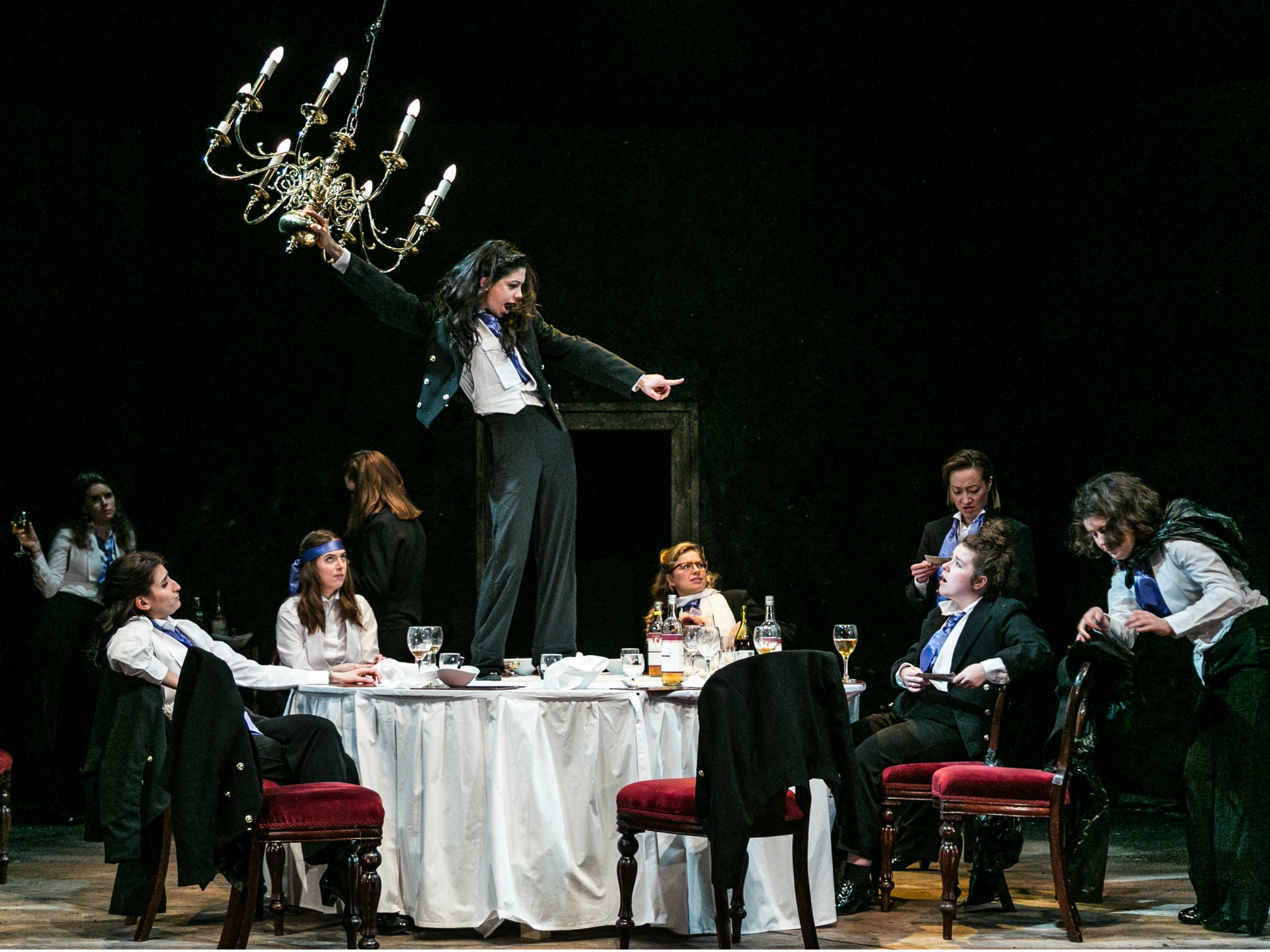Posh, Pleasance Theatre, London, review: It persuades you that the all-female casting is integral to the play's meaning
The new all-female production of Laura Wade's ‘Posh’, about a fictional version of the riotous Oxford students' Bullingdon Club, is directed by Cressida Carré

Your support helps us to tell the story
From reproductive rights to climate change to Big Tech, The Independent is on the ground when the story is developing. Whether it's investigating the financials of Elon Musk's pro-Trump PAC or producing our latest documentary, 'The A Word', which shines a light on the American women fighting for reproductive rights, we know how important it is to parse out the facts from the messaging.
At such a critical moment in US history, we need reporters on the ground. Your donation allows us to keep sending journalists to speak to both sides of the story.
The Independent is trusted by Americans across the entire political spectrum. And unlike many other quality news outlets, we choose not to lock Americans out of our reporting and analysis with paywalls. We believe quality journalism should be available to everyone, paid for by those who can afford it.
Your support makes all the difference.When I first heard about this project – a cross-dressed all-female cast impersonating the undergrads in an exclusive boys-only Oxbridge dining society, blatantly based on the Bullingdon club, in a revival of Laura Wade's hit 2010 play – my reaction was to wonder why any male actor would want to appear in this overrated, slightly off-key work, let alone female. Well, we came expecting to jeer, but we emerged ready to rave.
Director Cressida Carré's incisive and decisive seizure of the piece is up there with Phyllida Lloyd's three Donmar Shakespeare productions, presented as if performed by the inmates of a women's prison, for the thrilling subversion that explodes from it because of single-sex casting and because of the sheer assurance brought to it by a crack company.
For nearly 10 years, I taught at Oxford and sometimes had men of this ilk in my tutorial group. Some were very pleasant. Many were diabolically clever (a fact that this play doesn't demonstrate enough). On the two previous London outings of this play, I have found myself feeling protective towards characters based loosely on Cameron, Osborne and Johnson on the grounds that they didn't choose to be born into wealth and a swollen sense of entitlement. I also felt the play lays into them with the kind of bitter, rollicking prejudice that they show towards others, such as the working-class character owner of the rural restaurant – which they intend to trash after they have got thoroughly “chateau-ed” – and his smart, redbrick-educated waitress daughter. I also felt that the toffee-nosed oik-speak, though horribly funny, was too relentless to ring quite true.
But by giving all the roles to women in this neo-Brechtian way, this revival solves at a stroke most of those problems. It does not give the play over to wholesale caricature, but it slips the last surly bonds of “realism” and unveils a piece that now comes across as a biting, grotesque fable about a class that wants to reassert its brutal rights to special treatment – with the exhilarating twist that the oppressors are played by a group traditionally perceived as oppressed.
But if that sounds like an endeavour weighed down with worthiness, there's nothing remotely “correct” about the tone of the play or the production, which plunges us into the absurd traditions (one member having to wear “the wig of shame”), the ritualised gluttony (the massive roast of 10 birds tucked inside each other whose supposedly missing central layer sets off the violent humiliation towards the owner that was brewing from the outset).
The accoutrements of privilege are surrounded by stark, gutted walls in Sara Perks's powerfully suggestive design. It's as if the horror is always a foregone conclusion on these occasions. And it's as if Wade had always intended this show, which has provided young male actors with some career-making opportunities, to be played by women in gender-reversed way. You feel that this is how she probably first heard these voices in her head.
There's not a weak link in the cast as they communicate the rivalries and the tensions between a sense of individual and group survival. Cassie Bradley is forcefully unsettling as Dmitri, the loaded Greek with a chip on his shoulder. Serena Jennings gives a stunning performance as the loathsome Alistair Ryle, caressing the lines with a cruel drawl and whipping herself up into an almost eroticised chaleur as he inveighs against proles with their plasma screens, a sex worker who has demanded her rights and refused to get under the table and see to the waist-high needs of all the club at once, and generally anything that expects a share of immemorial privilege. When Alistair becomes the fall-guy, Jennings brilliantly suggests that Alistair championed this ethos so hard because he saw through it the most.
A mark of the production's power that it persuades you that the all-female casting is integral to the play's meaning and that it should be performed like this from now on.
Join our commenting forum
Join thought-provoking conversations, follow other Independent readers and see their replies
Comments